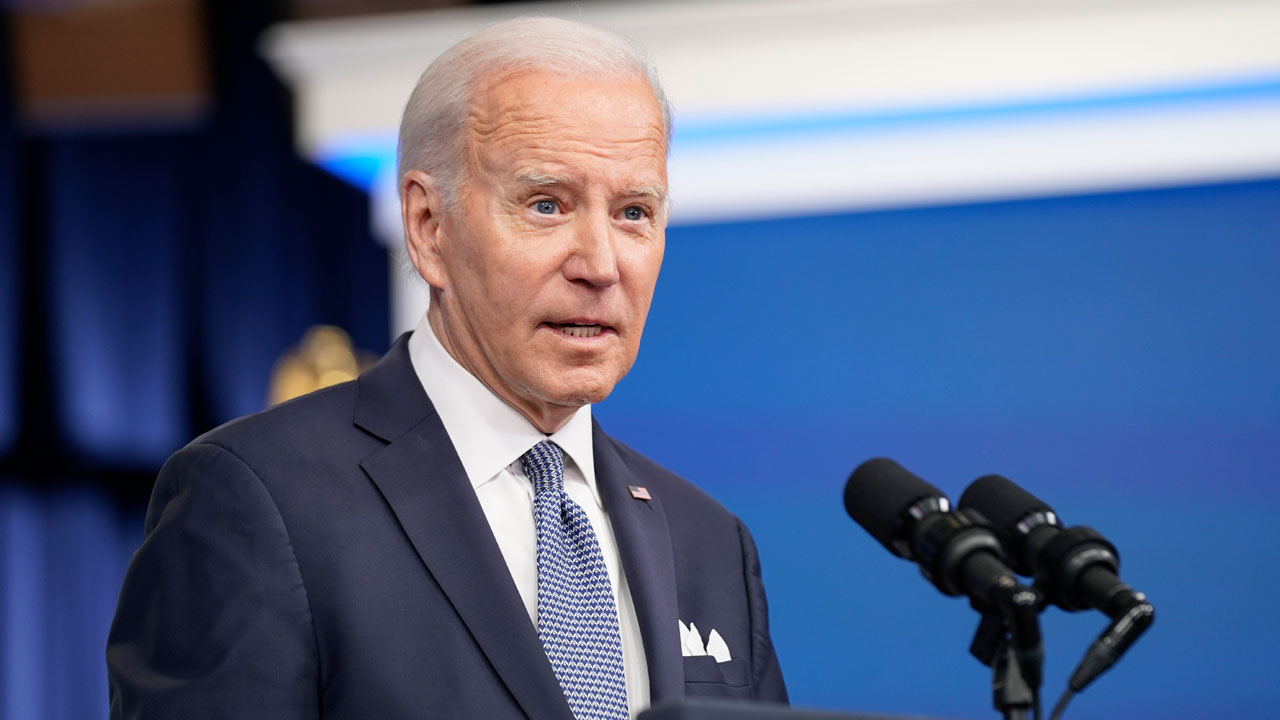CBS News Poll Finds Concerns About Biden Finishing A Second Term
The summer before an election year is not always kind to first-term Democrats.Sunday, September 17th 2023, 8:52 am
The summer before an election year is not always kind to first-term Democrats.
In August of 1995 Bob Dole led Bill Clinton. In the summer of 2011, the public's "grim views" of the economy, we said at the time, pushed Barack Obama's disapproval to its then-highest point.
That both presidents recovered and went on to reelection may give Democrats hope, because right now Joe Biden and the Democratic Party face major challenges of their own.
And those Democrats won't find any solace in this: today Mr. Biden is down one point, and inside the margin of error, in a match-up with Donald Trump, whom he beat by seven million votes three years ago.
With most voters unsure he'd stay through a second term if he did get one, and their concerns about whether Mr. Biden is healthy enough, it's all adding uncertainty for an already unsettled public.
That's about looking ahead, while Trump benefits from a strong retrospective view: almost all his voters believe "things were better" under him. The voters who feel they're worse off financially today are certainly voting as if that's the case.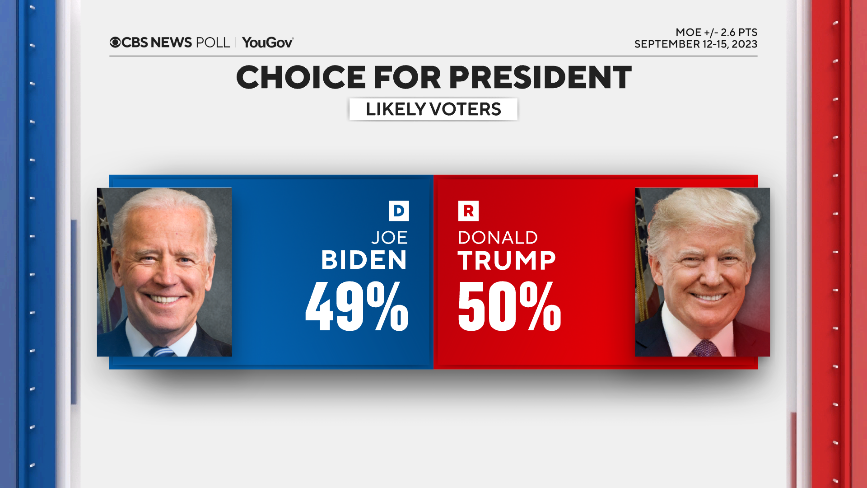 Image Provided By: CBS News
Image Provided By: CBS News
Age and fitness questions
It's not clear to voters that they'd get a full second Biden term if he won one, and that uncertainty is not helping him.
Only a third of voters think that Mr. Biden would finish a second term. Asked what might happen if elected again, more think he'd leave before finishing another term, or aren't sure.
Those who think Mr. Biden would leave during a second term are going 84% for Trump.
(Note that Trump, for his part, isn't overwhelmingly seen as a sure thing to finish a second term either; just over half think he would.)
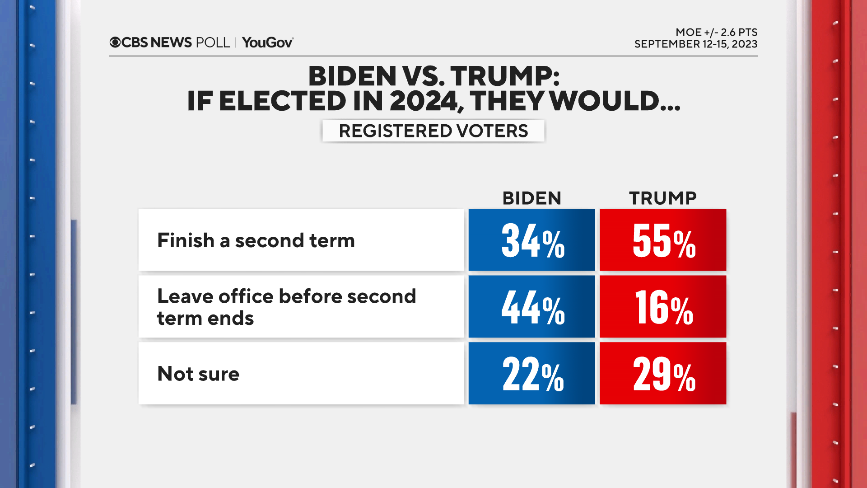 Image Provided By: CBS News
Image Provided By: CBS News
But this does seem to give the advantage to Trump: By almost three to one, voters think only Trump — and not Mr. Biden — is physically healthy enough for the job, although the two are just a few years apart.
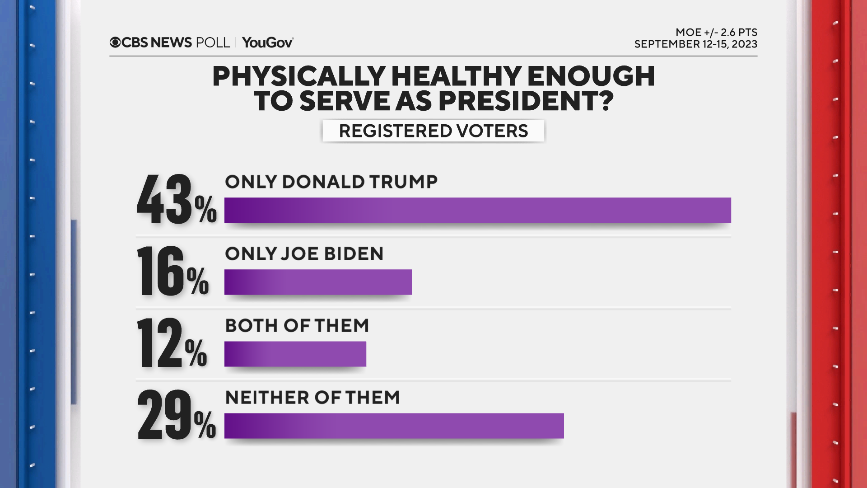 Image Provided By: CBS News
Image Provided By: CBS News
Voters are far more likely to think only Trump — and not Mr. Biden — has the cognitive and mental health to serve. (Nearly a quarter think neither of them does.)
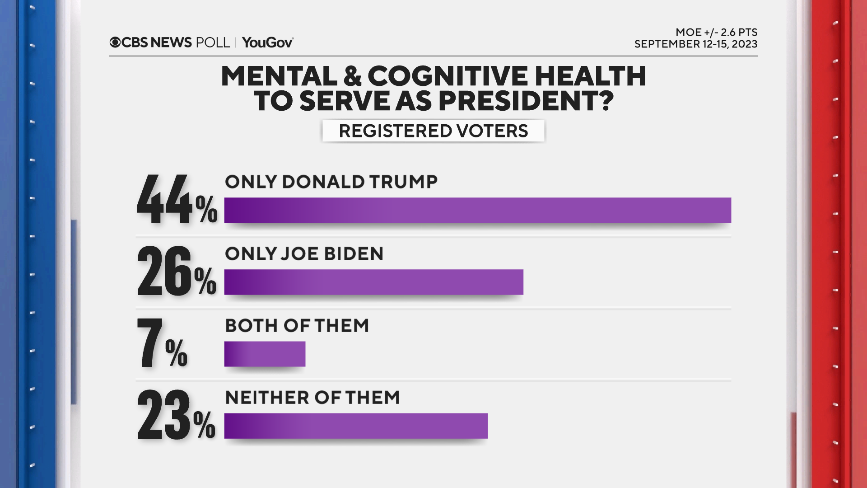 Image Provided By: CBS News
Image Provided By: CBS News
Republicans are a lot more sure of Trump's chances of finishing another term than Democrats are of Mr. Biden's.
Qualities that meet the moment?
The "calm" and "predictable" labels that voters still give Mr. Biden — and which seemed to meet the moment so well in 2020 — may look insufficient to them today.
Most voters also want "tough" and "energetic" qualities in a president, ones that they do not ascribe to President Biden – but do ascribe to Trump.
And Trump is described as "no-nonsense" in levels that Mr. Biden is not.
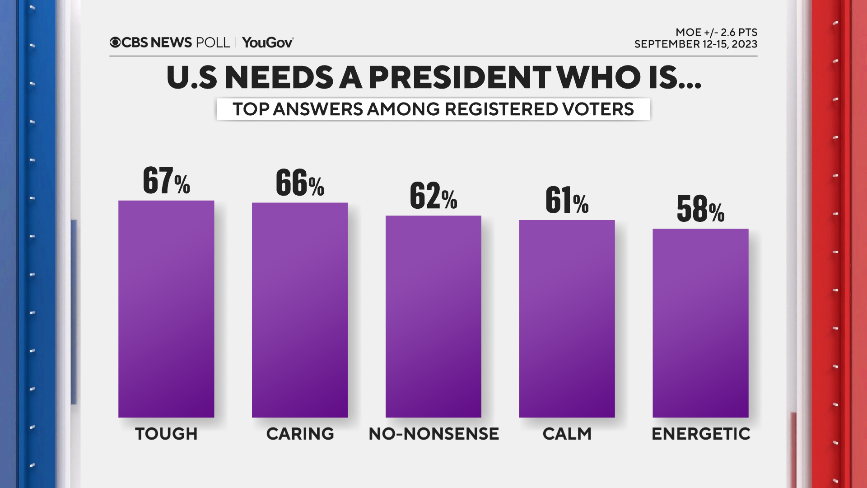 Image Provided By: CBS News
Image Provided By: CBS News
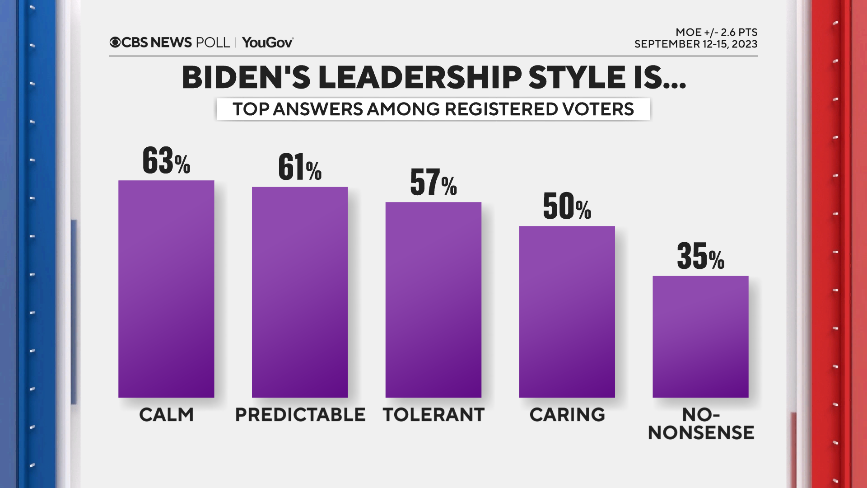 Image Provided By: CBS News
Image Provided By: CBS News
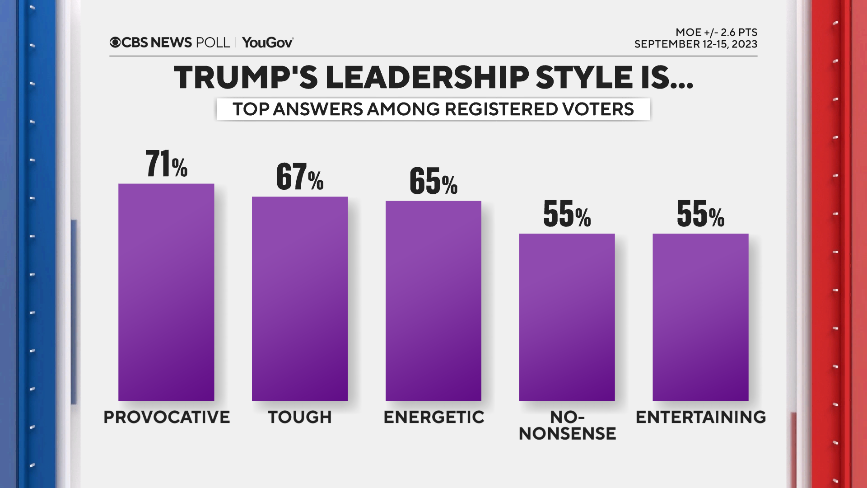 Image Provided By: CBS News
Image Provided By: CBS News
An important — and unwanted — contest
It's not exactly a matchup people are clamoring for: A big majority says getting a Biden-Trump rematch already means the political system is broken.
Some disparage their fellow voters who participate in primaries; few think it means they're the best candidates for the job.
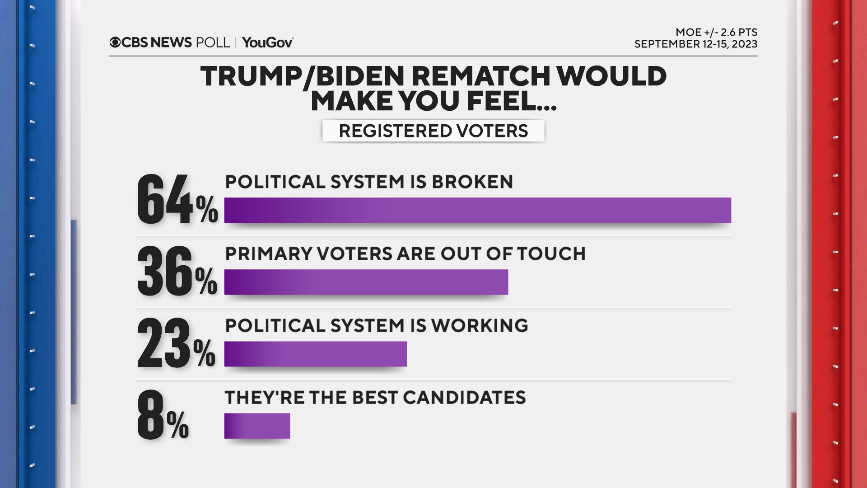 Image Provided By: CBS News
Image Provided By: CBS News
Almost three-quarters of voters think the fate of democracy depends on who wins in 2024, but in another sign of division, they think it's only chance hinges on their candidate winning.
For the third of voters who don't think either of them is physically healthy enough to serve, this may also be a contest they didn't want. (Most of them are Biden 2020 voters, and Mr. Biden does get the bulk of their votes now.)
Each candidate has their party feeling somewhat — but not completely — assured of victory. Partisans each think they've got a better-than-even shot next fall. That's important for context with the primaries — in the GOP primaries right now, Republican voters think Donald Trump is their most electable candidate; in 2020 Democrats thought that of Mr. Biden.
The pandemic may be over, but are you financially recovered?
Financially, the demarcation line for people may be pre- and post-pandemic as much as presidential administrations.
Nearly half of voters — and most independents — say they are worse off financially versus before the pandemic, far outpacing those who are better off. And people's measures of their financial security have not returned to where they were before the pandemic.
Voters overall, as well as independents, in particular, who feel they are financially worse off now than before the pandemic are backing Trump; the latter group by more than three to one.
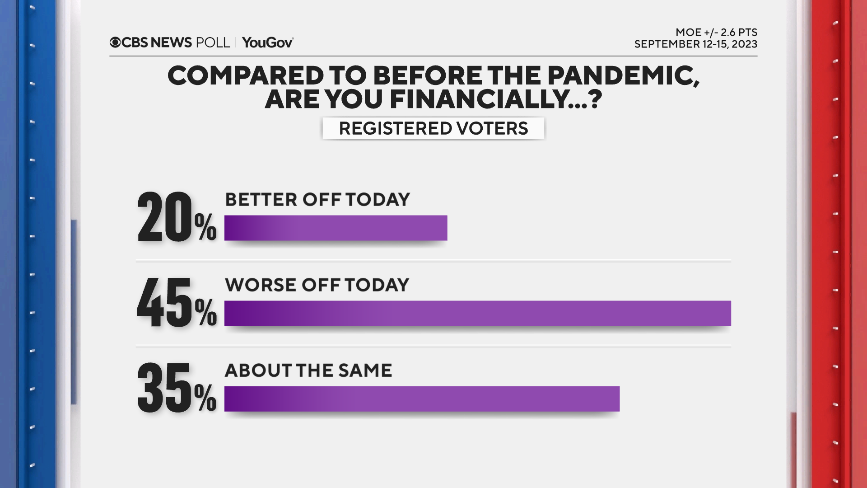 Image Provided By: CBS News
Image Provided By: CBS News
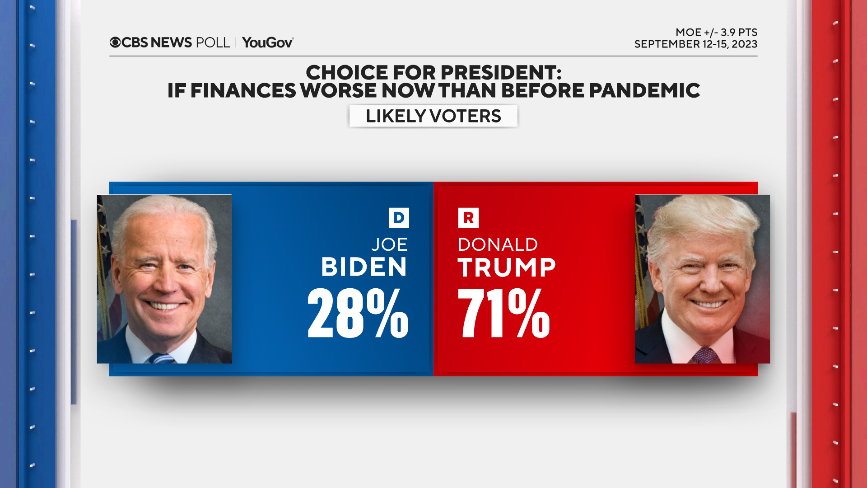 Image Provided By: CBS News
Image Provided By: CBS News
One of the administration's efforts has been to tout what it sees as Mr. Biden's accomplishments. A lot of voters do know about some key efforts, and it matters.
For example, independents who have heard about the Biden administration investing in infrastructure and allowing Medicare to negotiate drug prices are backing him, but those independents who have not heard about those things are voting for Trump.
But the Biden administration's efforts to reduce student loan debt has left few voters satisfied. Most members of his own party think he should be doing more, while Republicans and independents tend to think he should be doing less.
Do the parties help — or hurt?
Democratic efforts to try to portray the Republicans as too extreme don't seem to be playing to Democratic advantage because Democrats are described by just as many as extreme.
And there's just not a lot of differentiation between them.
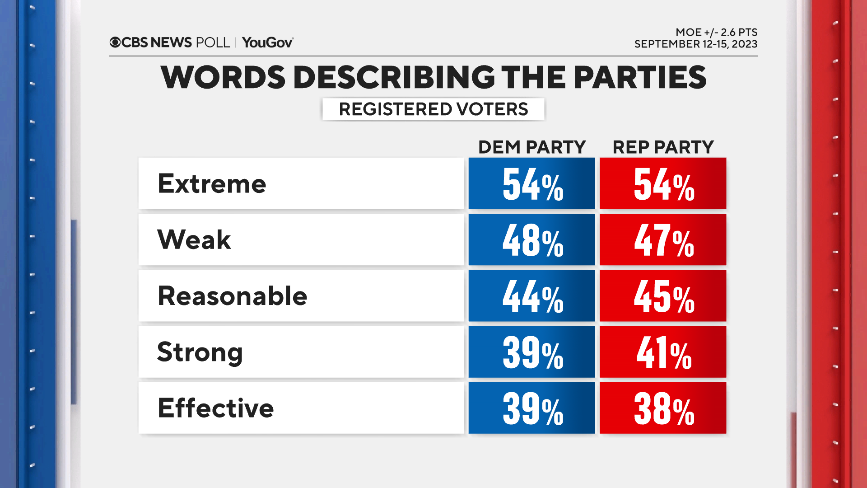 Image Provided By: CBS News
Image Provided By: CBS News
In particular, people who think the Democrats go too far on racial diversity and equality also overwhelmingly describe the Democratic Party as "extreme," more generally.
More than half of likely independent voters think Democratic stands on diversity go too far, and think the Democrats pay too much attention to those trying to be "politically correct." They're for Trump by large majorities.
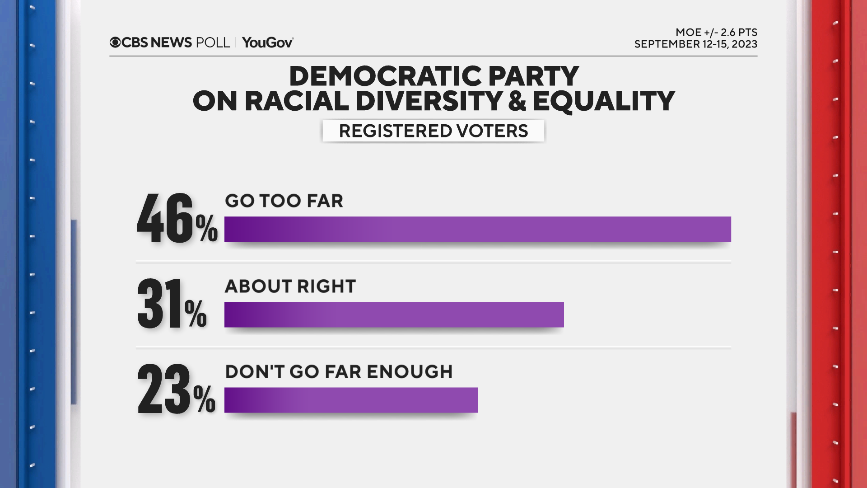 Image Provided By: CBS News
Image Provided By: CBS News
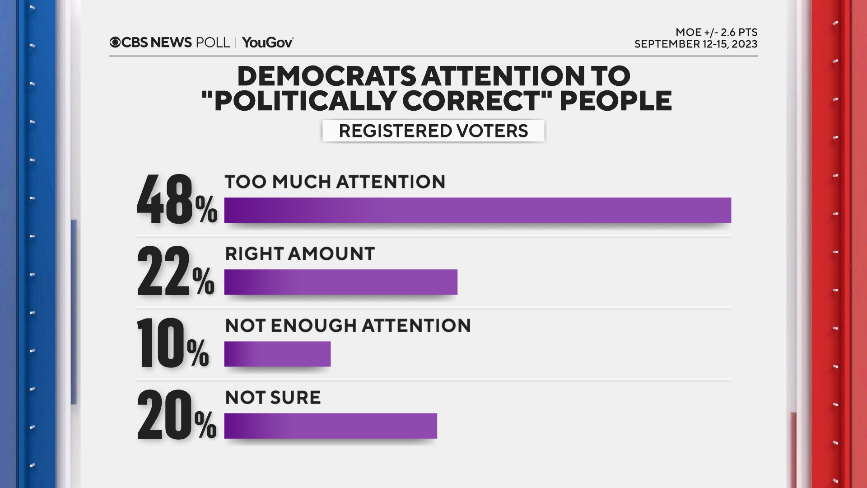 Image Provided By: CBS News
Image Provided By: CBS News
Independents who think the Democrats' stands on diversity and equality "go too far" are voting for Trump by eight to one.
Republicans, for their part, get called "extreme" by people who think the GOP pays too much attention to "MAGA" supporters, and by people who think abortion should be legal, not illegal.
Abortion helped the Democrats' chances in the midterms, and it sets up a potential edge for Mr. Biden. On net, views on abortion push voters toward the Democrats.
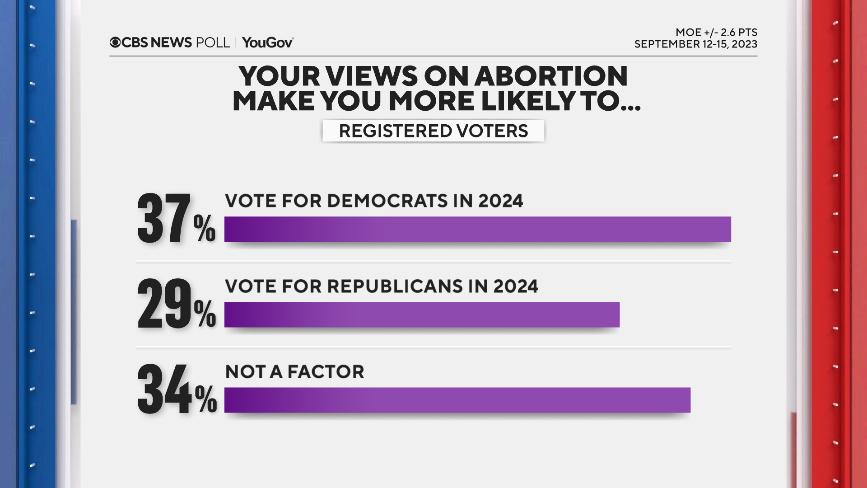 Image Provided By: CBS News
Image Provided By: CBS News
And impeachment proceedings in Congress don't seem to have much sway here, at least for now - it's just a (very typical) partisan split over whether the House GOP ought to try to impeach Biden over matters concerning his son Hunter Biden.
A closer look at the vote and reasons
Mr. Biden's campaign might look to make this more of choice than a straight referendum on Mr. Biden. That is taking hold for his voters, fully half of whom say their main motivation is to oppose Trump, rather than being for Mr. Biden.
Trump, for his part, draws more direct support as motivation.
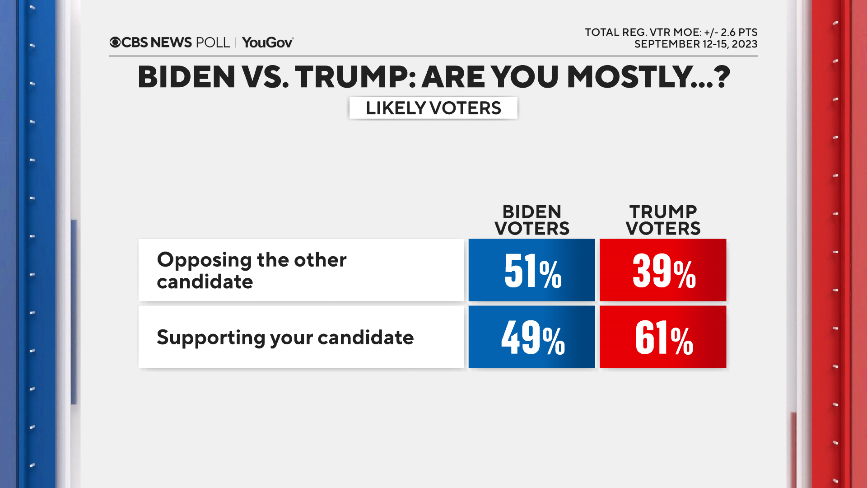 Image Provided By: CBS News
Image Provided By: CBS News
Almost all of Donald Trump's voters expressly give as their rationale that "things were better under Trump." It's a lot more than the number who say it's because they like him personally.
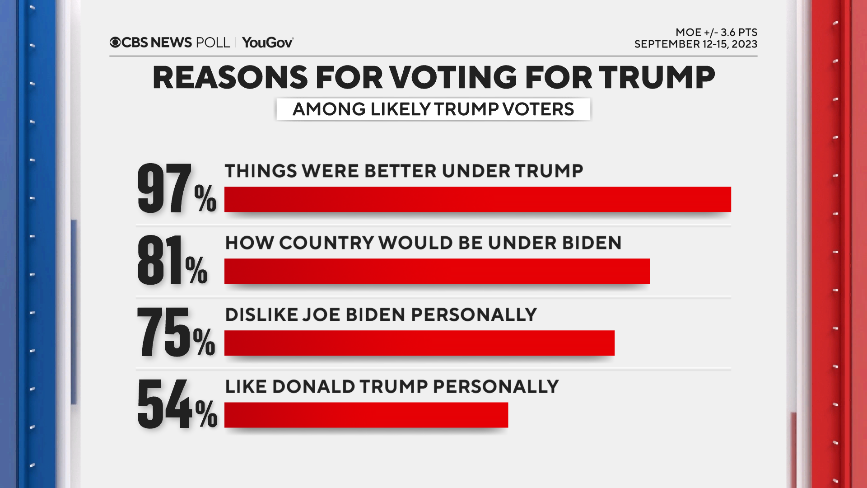 Image Provided By: CBS News
Image Provided By: CBS News
Mr. Biden may be disadvantaged right now because key parts of his 2020 coalition aren't as tuned in to the campaign yet. Black and Hispanic voters say they are less likely to be thinking about 2024 compared to White voters, and less likely (though it's a year off) to say they'll vote.
But for the moment, for those who will, Mr. Biden isn't running quite as strongly right now with key Democratic constituencies he'd need. He still wins Hispanics, but with 53%, and typically successful Democrats have gotten into the 60s. By two to one, more Hispanic voters say they're worse off financially, rather than better off, than they were before the pandemic. Mr. Biden still overwhelmingly wins Black voters, but at 81%, it's less than exit polls showed in 2020. Typically Democrats do better.
Each of Biden and Trump's 2020 voters are overwhelmingly supporting them again this time around, so small shifts matter. Biden today is losing 7% of those who backed him in 2020 to Trump. Trump only gives up 3% of his.
It's long been a misnomer when independents are conflated with swing voters. In reality most so-called "independents" say they vote mainly for one party, even though they call themselves independent. Only a relative handful of them — just a third — are truly independent and vote equally for either party over time. These make a good barometer: Mr. Biden is losing our "truly independent" definition today by 20 points. He was almost even with them in their 2020 votes.
Education gaps still hold — and even define — the race as they did in 2020: Mr. Biden maintains his small lead among White college-degree voters, as he had in 2020, and his large deficit with White non-college voters is roughly the same.
This CBS News/YouGov survey was conducted with a nationally representative sample of 4,002 U.S. adult residents interviewed between September 12-15, 2023. The sample was weighted according to gender, age, race, and education based on the U.S. Census American Community Survey and Current Population Survey, as well as past vote. The margin of error is ±2.1 points.
More Like This
September 17th, 2023
March 27th, 2025
March 27th, 2025
March 27th, 2025
Top Headlines
March 27th, 2025
March 27th, 2025
March 27th, 2025
March 27th, 2025


